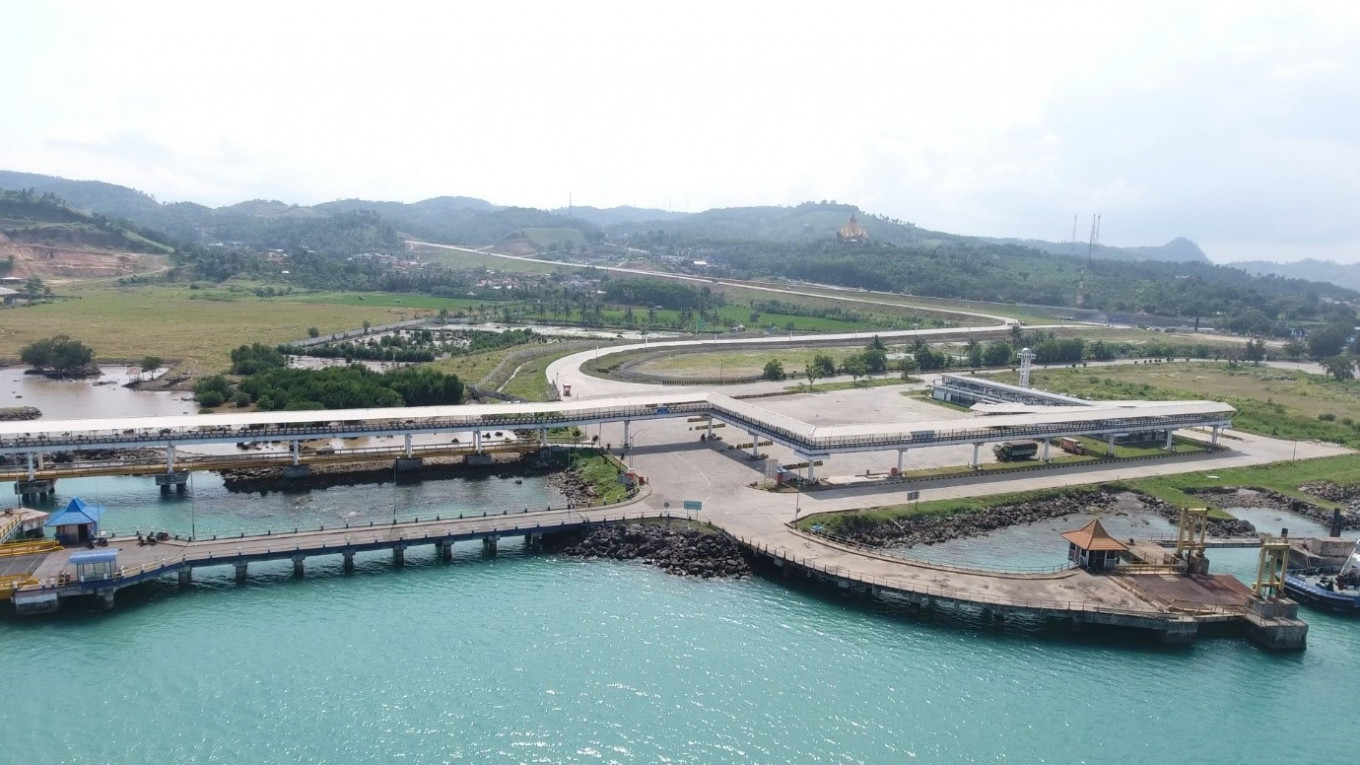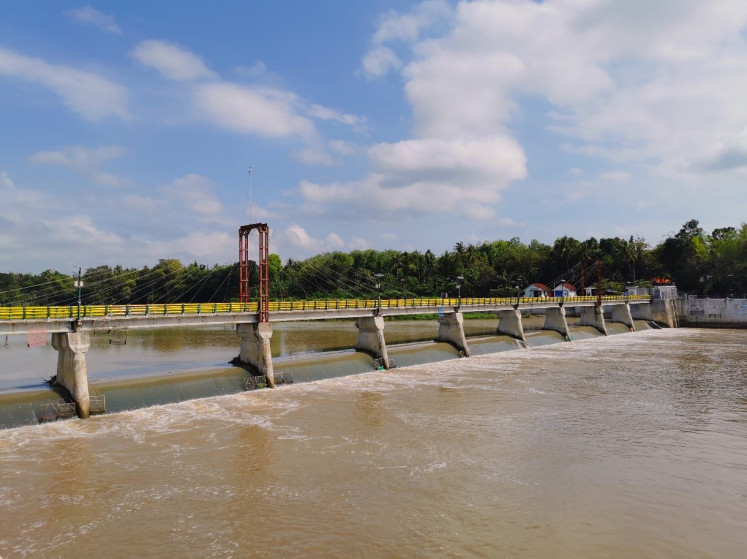Popular Reads
Top Results
Can't find what you're looking for?
View all search resultsPopular Reads
Top Results
Can't find what you're looking for?
View all search resultsAPBN 2024: Foundations for an Advanced Indonesia 2045
Change text size
Gift Premium Articles
to Anyone
A
mid the dynamics of the global economy, the state budget (APBN) has to function as a reliable shock absorber that is able to protect people's purchasing power, maintain economic stability, as well as maintain healthy and sustainable fiscal management.
The 2023 APBN journey is coming to a close. So far, the 2023 APBN has shown positive performance, income has grown in parallel with the increasingly strong recovery in economic activity and the benefits of tax reform, spending has remained able to protect people's purchasing power and support economic recovery and fiscal risks have become increasingly controlled as reflected in the deficit and debt maintained at manageable levels.
Hopefully, the positive performance of the 2023 APBN will continue until the end of the year, so that it will be a bountiful gift in preparation for the challenges of 2024. The 2024 fiscal policy is not an independent policy, but is part of a series of policies implemented from previous years and is at the same time connected to the direction and strategy of fiscal policy in the medium term.
Therefore, the performance of the 2023 APBN will be a solid foundation for welcoming the 2024 APBN. Likewise, the 2024 APBN will have strategic value in bringing Indonesia out of the middle-income trap toward a developed, fair and prosperous Indonesia in 2045.
In line with this, the 2024 APBN architecture must be able to respond to economic dynamics, answer challenges and support various development agendas.
The future economy will still face several obstacles that needs to be watched out for.
First, increasing geopolitical tensions and their impact on the geopolitical map and world trade. Second, the impact of climate change that is increasingly becoming palpable and requires anticipatory and mitigatory steps.
Third, the development of digital technology is accelerating and having a serious impact on behavior, both on the consumption and production side. Fourth, the transition from pandemic to endemic still needs to be anticipated and monitored, so that the transition to living with an endemic can run smoothly.
The various aforementioned challenges need to be monitored, but on the other hand, they are also great openings for the national economy to be able to utilize as opportunities for new sources of growth in realizing the vision of Advanced Indonesia 2045.
By considering the latest economic dynamics, as well as future economic prospects and policy direction to support the development agenda, the Basic Assumptions for Macroeconomics in 2024 that have been agreed are short-term strategy growth focused on better state spending; the economy at 5.2 percent growth, inflation at 2.8 percent, the rupiah exchange rate at Rp 15,000 per US dollar, the interest rate for Indonesian crude oil at US$2 per barrel and oil lifting of 635,000 barrels per day, as well as gas lifting of 1.03 million – 1,033 million barrels of oil equivalent per day.
The role of APBN
The 2024 APBN architecture is directed at accelerating inclusive and sustainable economic transformation. The role of the APBN is encouraged to function optimally as follows; firstly, the APBN as a shock absorber, protecting the people, stabilizing the economy and global shocks (food price stabilization, energy security, controlling inflation). Secondly, the APBN as a development agent (economic transformation accelerator) which focuses on human capital, physical capital, natural capital and institutional reforms. Third, the APBN is an instrument for realizing people's welfare (reducing extreme poverty, stunting and inequality).
Meanwhile, economic transformation will be pursued through two main strategies, namely the short-term strategy and medium-term strategy. The short-term strategy is focused on accelerating the elimination of extreme poverty, reducing the prevalence of stunting, controlling inflation and increasing investment.
The medium-term strategy is focused on the following five agendas. Firstly, creating superior human resources that are productive, innovative, prosperous and mutually empowered through improving the quality of education and the health system, as well as reforming the social protection system. Second is to accelerate the development of infrastructure to support economic transformation, especially infrastructure in the fields of energy, food, connectivity and information and communication technology. Thirdly, strengthening the implementation of bureaucratic reform and simplifying regulations. Fourth is increasing economic activities with high added value, through the downstream use of natural resources. Finally, to encourage the development of a green economy.
To support effectiveness in accelerating economic transformation, it is necessary to strengthen holistic fiscal reform through optimizing state revenues while maintaining the investment climate and environmental sustainability, followed by consistently making efforts to increase the efficiency and effectiveness of better state spending and encouraging innovative, prudent and sustainable financing.
By paying attention to the challenges and development agenda as well as comprehensive fiscal reform efforts, the posture of the 2024 APBN has been agreed as follows; state revenue is planned at Rp 2,802.3 trillion (US$181.4 billion), consisting of tax revenues of Rp 2,309.9 trillion and non-tax revenue (PNBP) of Rp 492.0 trillion as well as grants of Rp 0.4 trillion.
Secondly, state spending is allocated at Rp 3,325.1 trillion, consisting of central government expenditure amounting to Rp 2,467.5 trillion and transfers to regions amounting to Rp 57.6 trillion. Third, the negative primary balance of Rp 25.5 trillion was pushed to move toward positive. Fourthly, the budget deficit is Rp 522.8 trillion or 2.29 percent of gross domestic product (GDP), slightly lower than in 2023 of 2.27 percent of GDP.
Fifth is allocated for ministry/institution (K/L) expenditure in 2024, amounting to Rp 1,090.8 trillion, including to support various National Strategic Projects (PSN), implementation of the 2024 election, acceleration of economic transformation, increase in salaries for central civil servants, the Indonesian Military (TNI) and the National Police by 8 percent, infrastructure development by optimizing the use of domestic products, as well as adaptive and targeted distribution of social assistance.
Lastly, non-K/L expenditure was agreed at Rp 1,376.7 trillion, including to support an increase in pension benefits of 12 percent, provide subsidies and compensation to maintain people's purchasing power, as well as support farmers, micro, small and medium enterprises (MSMEs) and the business world.
Through an effective fiscal management, the 2024 APBN is expected to be able to respond to economic dynamics and support the development agenda. In line with this, the development targets and indicators were agreed, with the poverty rate set to be in the range of 6.5-7.5 percent, an open unemployment rate in the range of 5-5.7 percent, an extreme poverty rate in the range of 0-1 percent, the Gini ratio at 0.374-0.377, the human development index (HDI) at 73.99-74.02, the farmers' exchange rate (NTP) at 105-108 and the fishermen's exchange rate at 107-110.
Hopefully the joint efforts of all Indonesian people can be transformed into an advanced, prosperous and just nation.
Source: The Finance Ministry












